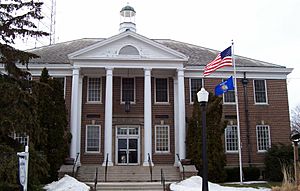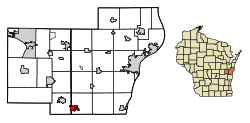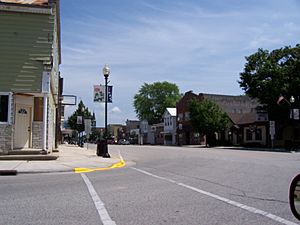Kiel, Wisconsin facts for kids
Quick facts for kids
Kiel, Wisconsin
|
||
|---|---|---|

Kiel City Hall
|
||
|
||

Location of Kiel in Calumet County, Wisconsin
|
||
| Country | ||
| State | ||
| Counties | Manitowoc, Calumet | |
| Area | ||
| • Total | 2.65 sq mi (6.86 km2) | |
| • Land | 2.52 sq mi (6.53 km2) | |
| • Water | 0.13 sq mi (0.33 km2) | |
| Elevation | 919 ft (280 m) | |
| Population
(2020)
|
||
| • Total | 3,932 | |
| • Estimate
(2024)
|
3,985 | |
| • Density | 1,483.8/sq mi (573.2/km2) | |
| Time zone | UTC-6 (Central (CST)) | |
| • Summer (DST) | UTC-5 (CDT) | |
| Zip |
53041, 53042, 53043
|
|
| Area code(s) | 920 | |
| FIPS code | 55-39525 | |
| GNIS feature ID | 1567461 | |
Kiel is a city in the state of Wisconsin, USA. It is located across two counties: Calumet and Manitowoc. In 2020, about 3,932 people lived there. Most of Kiel is in Manitowoc County. A smaller part, sometimes called "Hinzeville," is in Calumet County.
Kiel was once famous for being the "Wooden Shoes Capital of Wisconsin." This is because it had the only factory in Wisconsin that made wooden shoes.
Contents
History of Kiel
Early Settlement and Growth
The city of Kiel began when Charley Lindemann moved to the area. He started a settlement among the Menominee and Potawatomi Native American tribes. His wife named the new community after her hometown, Kiel, Germany.
Two years later, Col. Henry F. Belitz built a hotel and a mill. He built them on the north side of the Sheboygan River. People later called him the "Father of Kiel."
A road was built across Wisconsin to connect Green Bay with the Milwaukee area. In 1858, a bridge was built over the Sheboygan River. This bridge connected Kiel with Sheboygan.
Kiel's Manufacturing Past
From the late 1800s to the early 1900s, Kiel became a busy place for manufacturing. Businesses there made things like bricks, wooden shoes, machines, and furniture.
A book called "Yellowbird" tells about Kiel's early history in the 1850s. Henry Goeres, who lived in Kiel, wrote this book in the late 1800s. It mixes facts with fiction to describe how European settlers and Native Americans interacted.
Kiel officially became a village in 1892. Later, it became a city. Even today, Kiel has many different types of factories and businesses. This has always been a key part of the community.
Community Life in Kiel
Annual Events and Traditions
Kiel has several fun events each year. Every August, the city holds the Kiel Community Picnic, also known as the "Kiel Picnic." It takes place in City Park and lasts for four days, from Thursday to Sunday. The Kiel Parade is held on Fremont Street on the Sunday of the picnic. In the past, a cannon shot would announce the start of the picnic.
In February, Kiel hosts its Ice Sculpting Contest on Fremont Street. Teams compete to create amazing ice sculptures and win prizes.
Kiel has strong German roots. Because of this, the city celebrates "German Days" every June in City Park.
Local Culture and Recreation
The Kiel Municipal Band is a community marching band. It has been around since the late 1800s. The band is famous for its special song, "Invincible Fidelity."
The city also has several public parks and walking trails. The Solomon Biking Trail is a great place for biking. It connects Kiel with the nearby city of New Holstein.
Geography of Kiel
Kiel is located at 43°54′53″N 88°1′55″W / 43.91472°N 88.03194°W. It sits along the Sheboygan River.
The city covers about 2.67 square miles (6.92 square kilometers) in total. Most of this area, about 2.53 square miles (6.55 square kilometers), is land. The rest, about 0.14 square miles (0.36 square kilometers), is water.
Population Changes
| Historical population | |||
|---|---|---|---|
| Census | Pop. | %± | |
| 1880 | 363 | — | |
| 1890 | 497 | 36.9% | |
| 1900 | 924 | 85.9% | |
| 1910 | 1,244 | 34.6% | |
| 1920 | 1,599 | 28.5% | |
| 1930 | 1,803 | 12.8% | |
| 1940 | 1,898 | 5.3% | |
| 1950 | 2,129 | 12.2% | |
| 1960 | 2,524 | 18.6% | |
| 1970 | 2,848 | 12.8% | |
| 1980 | 3,083 | 8.3% | |
| 1990 | 2,910 | −5.6% | |
| 2000 | 3,450 | 18.6% | |
| 2010 | 3,738 | 8.3% | |
| 2020 | 3,932 | 5.2% | |
| 2024 (est.) | 3,985 | 6.6% | |
| U.S. Decennial Census | |||
Kiel's Population in 2010
In 2010, there were 3,738 people living in Kiel. These people lived in 1,565 households. About 33% of these households had children under 18. Most households (53.4%) were married couples living together.
The average age of people in Kiel was 38.7 years. About 26.5% of residents were under 18 years old.
Transportation in Kiel
Roads and Highways
Several important roads run through Kiel. Wisconsin Highway 67 goes north and south on the very east side of the city. Highways 32 and 57 pass through downtown Kiel.
The Sheboygan River
The Sheboygan River flows into Kiel from the Kiel Marsh. It winds through downtown, passing under a wooden footbridge and a car bridge. The river then leaves the city on the east side.
People do not usually use the river for transportation. However, it is popular for fun activities. In warm weather, people enjoy canoeing and fishing. In winter, they go ice skating and snowmobiling on the frozen river. There are also a few dams along the river.
Railroad Service
Kiel is served by the Wisconsin and Southern Railroad. This train line was first built in 1872 by the Milwaukee Road company.
Media
- Tri-County News is a local newspaper.
Notable People from Kiel
- Henry F. Belitz: He was a founder of Kiel. He also served as an officer in the American Civil War and helped elect Abraham Lincoln in 1864.
- Trevor Casper: A former Wisconsin State Trooper who died while on duty.
- Amy Krueger: A soldier who was a victim of the 2009 Fort Hood shooting.
- Karl Schleunes: A well-known historian and educator.
Images for kids
-
The Sheboygan River in winter
See also
 In Spanish: Kiel (Wisconsin) para niños
In Spanish: Kiel (Wisconsin) para niños
 | Calvin Brent |
 | Walter T. Bailey |
 | Martha Cassell Thompson |
 | Alberta Jeannette Cassell |







